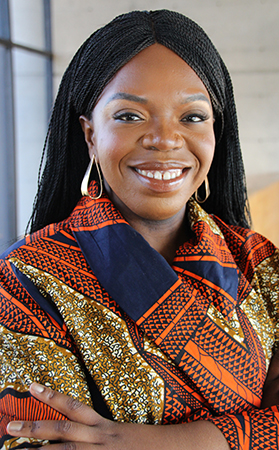When student Munzungu Nzeyedio was paired with the Duke Heights Business Improvement Association (BIA) last year, it was a great opportunity for both parties.

Nzeyedio, a mature student in her third year in in the honours program in political science and public policy and administration, had the opportunity to integrate her classroom learning with a relevant work experience and the BIA obtained a community outreach intern to take on some necessary projects. None of it would have been possible without the Internship Awards Program (IAP) that is run by the Faculty of Liberal Arts & Professional Studies (LA&PS).
“Internships are a common activity for students in professional programs, but this program opens up opportunities for social science and humanities students to apply their skills in the real world,” said Melanie Belore, the Faculty’s associate director of experiential education.
The awards program, now entering its third year, provides LA&PS students with a monetary award that subsidizes their work with a not-for-profit and/or a social justice organization, replacing an internship salary that these organizations wouldn’t be able to afford. The students work for the organizations during the summer and don’t receive credit, although the experience is noted on their transcripts. They must submit a reflection piece at the end of the internship.
Working with the Duke Heights BIA, an organization representing about 2,500 businesses in the Dufferin-Keele area of Toronto, Nzeyedio was tasked with revamping the organization’s free legal information platform (DUKE Law), working with York University to facilitate student placement opportunities at local BIA employers and forging connections with other community-based organizations. Although her internship was originally a three-month term, the BIA kept her on as a paid intern for an additional six months.
“I highly, highly recommend it, although it’s important that your academic program is related to your position,” Nzeyedio said. “It builds confidence and capacity and you find that you can transfer your academic skills and integrate them into the actual work environment.”
She also discovered that working for a small, financially lean organization wasn’t always easy.
“The resources you have are restricted, so you have to be creative and find innovative solutions,” she said. “I did the best I could with the resources available. It was an opportunity and it was challenging. I created a streamlined process with regard to what can and should be done.”
In addition to the hard skills she acquired, Nzeyedio says she learned diplomacy, tact, relational intelligence and how to cultivate a consensus-building approach in a work setting.
“I built my own definition of leadership,” she said, “and I learned to trust in my own capacity to do what I needed to do. This opportunity gives me a competitive edge.”

The Internship Awards Program started small, with five participants the first year; this coming summer, there will be 22 awards made.
“We’re still new and are building a bank of non-profit organizations for students to work with,” said Belore. “We put a call out to faculty for contacts and do outreach in the GTA. Organizations submit their applications in the form of job descriptions.”
Third-year students with 54 credits or more and fourth-year students who will return in the fall to complete at least 15 credits may apply if they have a grade point average of six or more and are honours students. They must submit an application, a resume, a statement of purpose and a letter of recommendation in order to be considered.
The awards have three main themes: social justice, economic justice and Indigenous rights, all themes with a social impact.
“I think the program is unique to York and LA&PS,” said Belore. “It’s aligned with the University’s foundational values and rooted in a sense of social justice. It’s an extension of what makes York special.”
By Elaine Smith, special contributing writer to Innovatus
Originally published in YFile.
